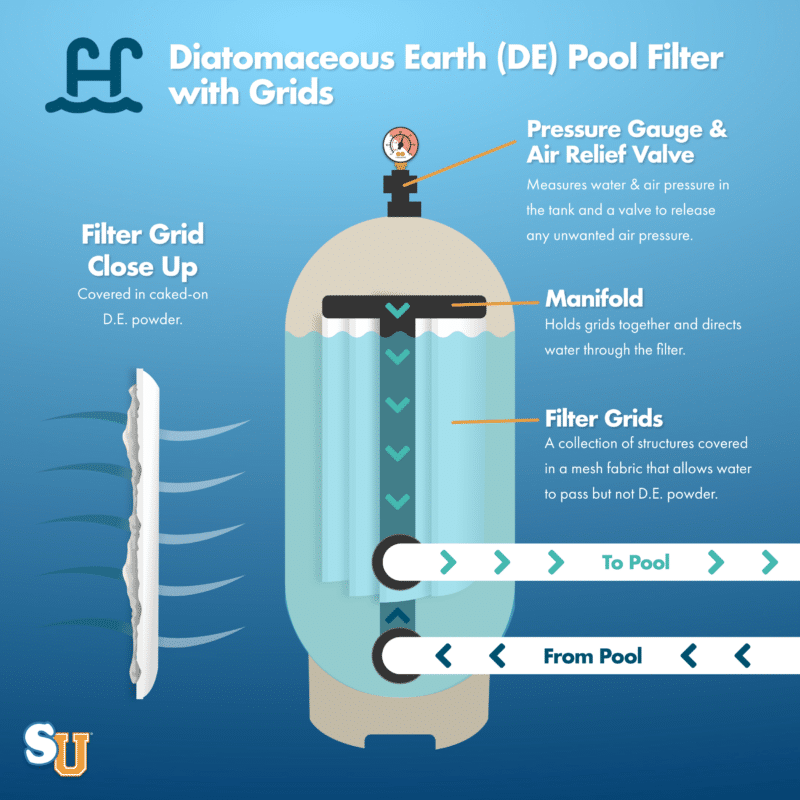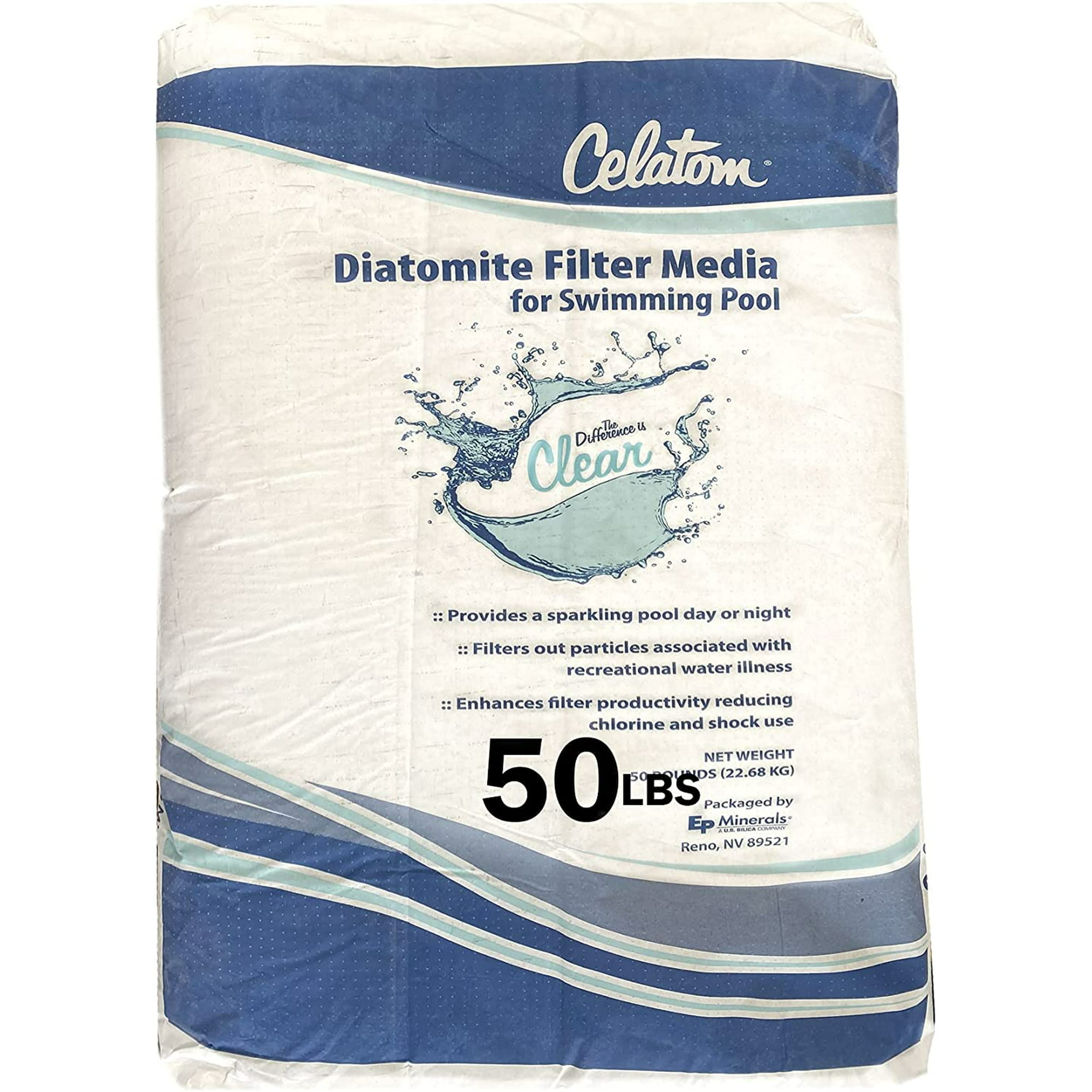Why Diatomaceous Earth Filtering Is the Preferred Choice for Many Water Systems
Why Diatomaceous Earth Filtering Is the Preferred Choice for Many Water Systems
Blog Article
Diatomaceous Planet Filtering: A Natural Solution for Superior Water Filtration

Diatomaceous Earth (DE) filtering system has emerged as an engaging method for improving water purification, utilizing the special residential or commercial properties of fossilized diatoms. As issues over water quality escalate, recognizing the benefits and useful applications of DE filtering becomes progressively relevant.

What Is Diatomaceous Earth?
Diatomaceous planet (DE) is a normally occurring, soft, stratified rock that is composed mostly of the fossilized remains of tiny water organisms referred to as diatoms. These single-celled algae possess an unique, silica-based cell wall that adds to the unique homes of DE. The rock is usually light and porous, permitting it to absorb various substances effectively.

Because of its high porosity and absorptive ability, DE offers many applications, including its use in farming, insect control, and, especially, water filtration. The performance of diatomaceous planet in filtering is associated to its capacity to trap and eliminate contaminations from water, making it a progressively preferred choice among those looking for all-natural filtering remedies. Its environment-friendly nature and adaptability even more improve its appeal throughout various sectors.
Exactly How Diatomaceous Earth Filtering Functions
The distinct framework of diatomaceous planet (DE) allows it to work as an effective filtering tool in water purification systems (diatomaceous earth filtering). Composed of the fossilized remains of tiny, aquatic microorganisms referred to as diatoms, DE has a porous and highly absorptive nature. This elaborate structure permits DE to catch impurities and pollutants as water streams via it, properly eliminating fragments as little as 1 micron
When water is passed via a DE filter, the fluid experiences a network of tiny pores that capture suspended solids, bacteria, and various other unwanted materials. The filtering process happens because of both mechanical and electrostatic communications, where bigger particles are physically trapped within the DE's matrix, while smaller fragments might abide by the surface area because of charged communications.
In addition, DE can be made use of along with other purification techniques to improve overall performance. As water proceeds to stream through the DE layer, it slowly ends up being clearer and cleaner, showcasing the tool's capacity to enhance water top quality without the demand for harsh chemicals. This natural purification process highlights diatomaceous planet's duty as a reliable and lasting solution for water purification.
Benefits of Diatomaceous Earth Filtering
Performance in water filtration is significantly improved with the use of diatomaceous planet (DE) filtering system, supplying various advantages that make it a favored selection for numerous applications. One of the main benefits of DE filtering is its capacity to remove a vast array of pollutants, including tiny microorganisms, sediments, and even particular chemicals. This ability makes certain that the water purified through this technique is not just clean however additionally risk-free for intake.
Furthermore, DE filters have a high flow price, which enables quicker purification compared to typical methods. This characteristic is particularly useful for large-scale operations such as local water treatment plants or swimming pools. Using DE additionally decreases the demand for harsh chemical additives, promoting a much more eco-friendly technique to water purification.
Additionally, DE filtering system systems are reasonably very easy to keep, calling for less regular substitute than various other filtering media. The natural beginning of diatomaceous planet adds to its sustainability, making it an eco-conscious selection. In general, the mix of efficiency, efficiency, and ecological advantages positions diatomaceous planet filtering as a leading solution in the world of water purification.
Comparison With Conventional Water Filters
When reviewing water filtration techniques, diatomaceous planet filtering system stands apart in contrast to traditional water filters. Conventional water filters, such as triggered carbon or ceramic filters, primarily concentrate on getting rid of contaminants with adsorption or physical barriers. While these techniques work for certain contaminations, they might not record smaller sized fragments, YOURURL.com germs, or infections as efficiently as diatomaceous planet (DE) filters.
Diatomaceous planet filtering system makes use of the distinct structure of diatomite, made up of microscopic, porous fossilized algae. This permits DE filters to catch fragments as tiny as 1 micron, providing remarkable purification abilities. Furthermore, DE filters can deal with bigger quantities of water without considerable stress loss, making them ideal for both commercial and property applications.
Furthermore, diatomaceous planet is a sustainable and all-natural material, posing fewer ecological issues compared to some artificial filter media. On the other hand, conventional filters usually call for regular substitute and disposal, causing raised waste.
Applications and Use Instances
Diatomaceous planet (DE) filtering system has a varied variety of applications across various sectors as a result of its reliable filtration capacities. One of one of the most popular usages of DE is in the food and drink industry, where it functions as a purification medium for beer, a glass of wine, and juice manufacturing. Its permeable structure successfully gets rid of contaminations, making certain a palatable and clear end product.
In the realm of swimming pool maintenance, DE filters are preferred for their capability to trap penalty particles, offering superior water clearness compared to standard sand filters. Furthermore, DE is made use of in metropolitan water therapy facilities, where it helps in the elimination of put on hold solids, germs, and other contaminants, adding to risk-free alcohol consumption water.

Beyond water filtration, diatomaceous earth finds applications in the farming industry as an all-natural pesticide and dirt amendment, advertising healthier crops while lowering chemical use. In addition, its absorptive properties make it valuable in numerous commercial processes, consisting of oil spill clean-ups and as a filler in construction materials. Overall, the flexibility of diatomaceous planet filtering system settings it as a beneficial service for boosting water top quality throughout numerous domain names.
Final Thought
Diatomaceous planet filtering stands for a effective and lasting method for water purification. Its special properties enable the capture of microscopic contaminations without using harmful chemicals, thus promoting ecological safety and security. The high flow rate and low upkeep demands further boost its charm compared to typical filtration approaches. As understanding of water top quality concerns grows, the fostering of diatomaceous planet filters in numerous applications is here most likely to boost, contributing to enhanced public health and wellness and ecological preservation.
Diatomaceous Earth (DE) filtering has check this arised as a compelling method for boosting water purification, making use of the distinct residential or commercial properties of fossilized diatoms. As water continues to move with the DE layer, it progressively ends up being clearer and cleaner, showcasing the tool's capacity to improve water high quality without the need for severe chemicals.Effectiveness in water purification is substantially enhanced through the usage of diatomaceous earth (DE) filtering, providing countless advantages that make it a preferred choice for several applications.When reviewing water purification techniques, diatomaceous planet filtering stands out in contrast to standard water filters. Typical water filters, such as activated carbon or ceramic filters, primarily focus on eliminating pollutants through adsorption or physical barriers.
Report this page